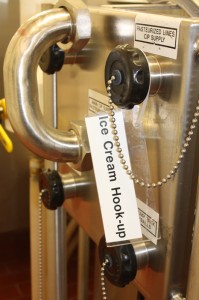
With the blustery weather of the last few days, it’s hard to believe that Monday was hot and humid enough to think about sweet and frozen treats. You don’t have to twist my arm very hard for ice cream, so when NC Folklife Institute Director Joy Salyers suggested a side trip over to Raleigh to taste and learn more about Howling Cow Ice Cream, I already had a spoon in my hand.
Where were we going? It might help to know that one of their top-selling flavors is Wolf Tracks. If you guessed North Carolina State University, you’d be correct. Maybe you’re one of the thousands of people who stood in line to buy some of the 4,000 gallons of ice cream they sold in ten days at the NC State Fair last month. But if you’re like me – awfully curious but daunted by one of the longest lines at the fair – you’ll be glad to know that you can get yourself a scoop of Howling Cow almost any time, if you know where to find it.
We parked by the loading dock of Schaub Hall, home to NC State’s Department of Food, Bioprocessing and Nutrition Services, where Carl Hollifield was waiting to give us our very own tour of the processing facility, tell us about the history of this half-century-long tradition, and share some ice cream with us, too!
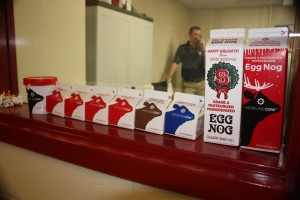
It was an amazing combination of the latest in food science and research, and the long tradition of dairy farming in our state. As Carl walked us through the Feldmeier Dairy Processing Lab, showing us the streamlined and gleaming stainless steel lines, we heard about the educational working dairy out on Lake Wheeler Road, where they have the same number of Holsteins and Jerseys as the average NC dairy. NCSU has been producing milk and ice cream from their dairy for decades, but because of North Carolina’s Umstead Act of 1939 (which says government agencies can’t compete with private industry) it can’t be sold in regular markets. Thanks to specific exemptions, Howling Cow milk and ice cream is provided to campus dining halls, and is sold at various locations on campus.
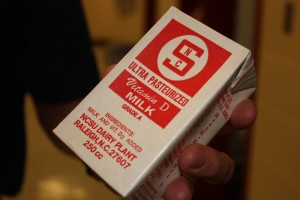
NCSU has a long list of accomplishments in dairy history: it produced the state’s first pasteurized milk in 1918. But its ice cream is our favorite dairy accomplishment! What makes it special? We’re glad you asked. There are a couple of universities that have their own dairy herds, and others produce their own ice cream, but NCSU has an integrated farm system – all the milk for the ice cream comes from their own cows, through their own processing, to their own stores. Also, because it’s a small operation, Howling Cow is able to cure its ice cream longer than most commercial dairies, which allows the flavors to bloom. And they use natural flavors whenever possible.
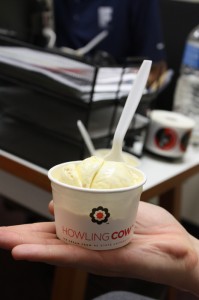
Carl gave us samples of their new banana pudding ice cream, but we wouldn’t be real food adventurers if we only tried one flavor! So we swung by a Creamery store and got some more. I had Wolf Tracks and Joy had the chocolate peanut butter spin (which, by the way, she is still raving about). (Joy here – listen folks, I am frankly not a big chocolate ice cream fan. But this chocolate was really good – and it didn’t have a thin peanut butter-flavored swirl in it; it had thick, rich peanut butter stirred into the ice cream. Hmmm, I might be ready for another trip!)
Now you can buy Howling Cow in a number of storesacross campus – you can even order a 3-gallon tub for a party! But for visitors who want a cup or a shake, the most accessible location (which also carries the most flavors!) is the Creamery Shop in D. H. Library. Just park across the street from the library on Hillsborough Street and order at the walk-up window or go inside. They’re open whenever students are on campus. We’re hoping it’ll soon be the worst-kept secret in the state.
And, guess what? Egg-nog sales started YESTERDAY.
(c) 2012
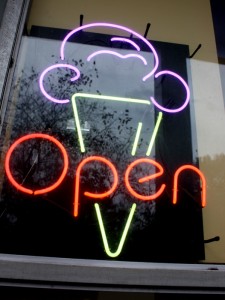
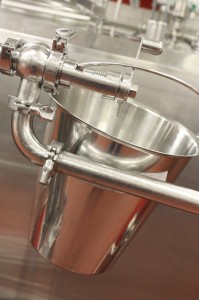
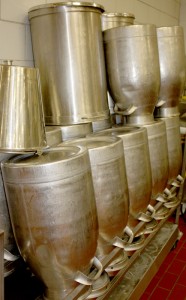
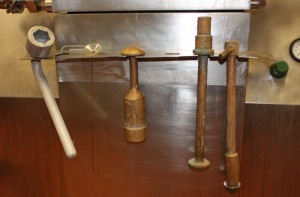
Leave a Reply